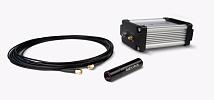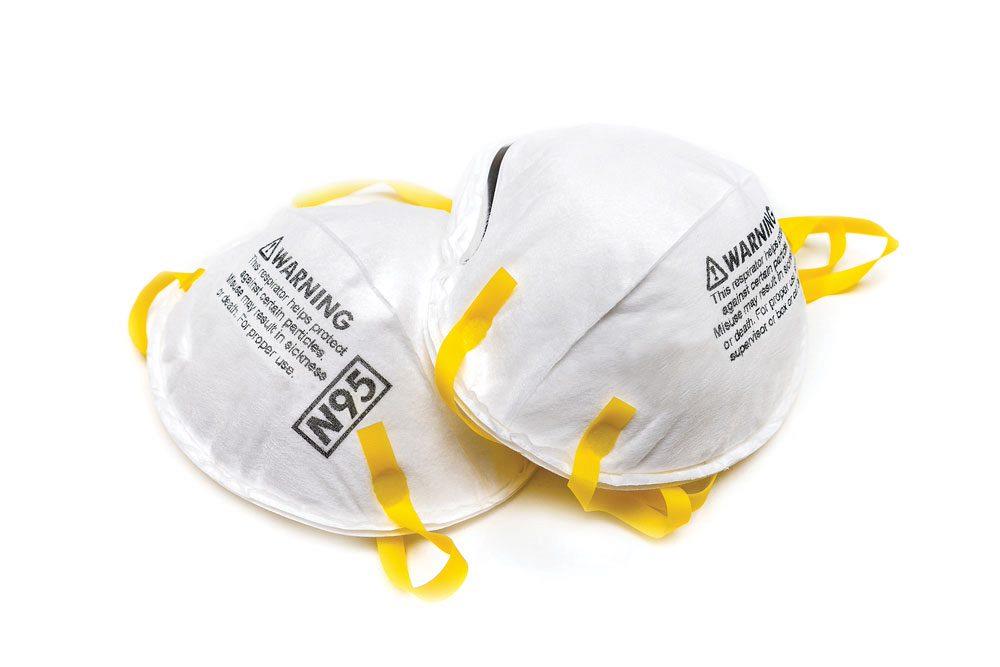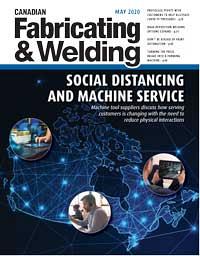Editor
- FMA
- The Fabricator
- FABTECH
- Canadian Metalworking
PPE pressures
Sourcing and education are the keys to managing supply crunch
- By Rob Colman
- June 1, 2020
- Article
- Health & Safety
Anybody who has gone shopping for hand sanitizer, bleach, and many other cleaning products can attest to the fact that they have become hard to find. Industrial hygiene suppliers are feeling the same strain, doing what they can to meet the needs of regular customers while also meeting the urgent needs of front-line public service agencies managing the pandemic response.
“It’s a difficult challenge,” said Donny Braga, head of product management, at industrial supplier Würth Canada Ltd., Guelph, Ont., which supplies fabricators with a broad range of products, including PPE and cleaning supplies. “The supply chain is such that you typically forecast eight months out what you will need. That model has been disrupted completely.”
Glove Supplies
While some products can be sourced locally, Braga said that others are almost exclusively manufactured overseas.
“Gloves, for instance, are a very hot topic in the marketplace,” he said. “All disposable gloves are manufactured overseas, and there are only so many manufacturers in the world, so it has been a struggle to replenish those supplies. We have had to scramble to find alternative sources for gloves and bring them into Canada even when they aren’t Wurth branded to meet the needs of our customers.”
Braga advised anyone looking to source gloves to jump at the opportunity to purchase that product if they find a supplier who can furnish precisely what they are looking for.
“Take advantage of that and stock up because this situation isn’t going to improve for some time,” he said. “We are not going to see standard inventory levels probably until spring or summer 2021.”
Meantime, Braga is encouraging his sales team to educate its customers in how best to extend the life of products through proper maintenance and encouraging the use of other products where it makes sense.
“The first thing anyone using disposable gloves should ask themselves is, ‘Can I make these gloves last longer? Do they need to be disposed of quite so promptly, or can they be reused with the proper amount of care?,” Braga explained.
A second option is switching to a nitrile-coated reusable glove.
“These nitrile-dipped gloves are very effective for use on a lot of jobs, and provided that they are cleaned properly, they can last quite some time,” said Braga. “We are encouraging our sales team to educate customers about both the value of these products and the proper care of them so that customers get the full value of their investment.”
Mask Options
During the initial rise of COVID-19 in Canada, the government downplayed the importance of wearing masks. However, their use in hospitals has been critical, making their availability elsewhere in the market scarce. Only the loosening of regulations is allowing a broader availability of masks for a number of uses.
N95 respirators have become a hot commodity. These are the particulate-filtering masks that are required in hospital settings for seeing patients and are NIOSH-approved.
“Because of the shortage of these, the government has loosened regulations and is currently allowing the use of KN95 respirators, which are rated using alternate standards in Asia,” said Braga. “When you look at the spec sheets for the two, you can see they are quite similar in many respects. We are now importing these as well.”
Cleansers and Sanitizers
Würth, like many other companies, has been re-evaluating its product offering to meet new demands for disinfectants and other cleaning products.
“We have disinfectants that are approved for managing COVID-19, but the increased demand means that we are being asked to supply them in larger quantities,” said Braga. “For example, we’re now offering these disinfectants in 4 l and 20 l versions, whereas previously they were only offered in smaller units. We fast-tracked the creation of these alternatives.”
The company has also sourced hand sanitizer from a company in Alberta that repurposed its facility to manufacture the product.
“We’re quickly expanding our product offering to meet the needs of shops that maybe didn’t consider hand sanitizer a priority before,” said Braga.
Expectation Management
Customer care can be a challenge when supply chains are as congested as they currently are for PPE. Wurth has decided to tackle this by communicating as much as possible with its own sales staff, ensuring they are putting the right message out there in the market.
“We created an internal document that gets sent to the sales team twice a week,” said Braga. “It gives them an inventory status, a back-order status, and the estimated time of arrival for any outstanding products. This gives the sales force a certain amount of transparency so that they are able to give realistic projections to their customers.”
One of the toughest issues in the supply chain now is fighting the “price gouging” label that gets stuck to a company when its product suddenly costs twice as much as it did a year ago.
“Unfortunately, we can’t control the cost of items coming in from overseas,” said Braga. “Some items have had to be shipped by air freight for timely delivery, and in other cases, the cost of purchasing them from outside Canada has risen far beyond the price we used to sell them for.”
While companies do what they can to source product close to home, it isn’t always possible. If nothing else, this pandemic will accentuate the value of having “Made In Canada” supply options for many products.
Braga encourages companies shopping for PPE during this challenging time to look at their options and, if it’s difficult to find what they normally use, to see what alternatives are out there in the marketplace.
“The situation changes every week,” he said. “Everyone is adapting to the situation and finding new ways of tackling the jobs we do every day. If you can’t find exactly what you are looking for, talk to your suppliers about how you can find an alternative. We’re all doing what we can to figure these challenges out.”
Editor Robert Colman can be reached at rcolman@canadianfabweld.com.
Würth Canada Ltd., www.wurth.ca
About the Author

Rob Colman
1154 Warden Avenue
Toronto, M1R 0A1 Canada
905-235-0471
Robert Colman has worked as a writer and editor for more than 25 years, covering the needs of a variety of trades. He has been dedicated to the metalworking industry for the past 13 years, serving as editor for Metalworking Production & Purchasing (MP&P) and, since January 2016, the editor of Canadian Fabricating & Welding. He graduated with a B.A. degree from McGill University and a Master’s degree from UBC.
subscribe now


Keep up to date with the latest news, events, and technology for all things metal from our pair of monthly magazines written specifically for Canadian manufacturers!
Start Your Free Subscription- Trending Articles
Aluminum MIG welding wire upgraded with a proprietary and patented surface treatment technology

Hypertherm Associates partners with Rapyuta Robotics

Protected and productive: welding helmet tech

HGG Profiling Equipment BV names Western Canada area sales manager

Compact weld camera monitors TIG, plasma processes

- Industry Events
Automate 2024
- May 6 - 9, 2024
- Chicago, IL
ANCA Open House
- May 7 - 8, 2024
- Wixom, MI
17th annual Joint Open House
- May 8 - 9, 2024
- Oakville and Mississauga, ON Canada
MME Saskatoon
- May 28, 2024
- Saskatoon, SK Canada
CME's Health & Safety Symposium for Manufacturers
- May 29, 2024
- Mississauga, ON Canada
















